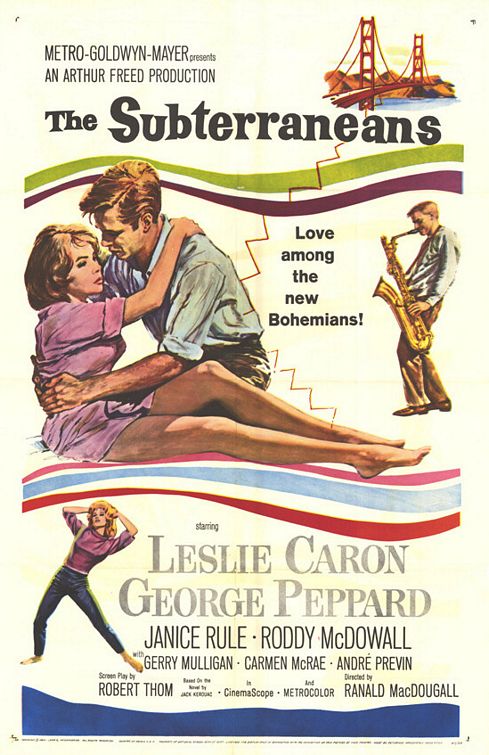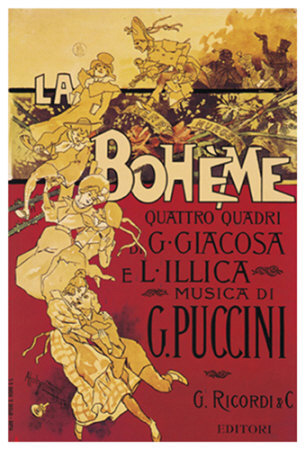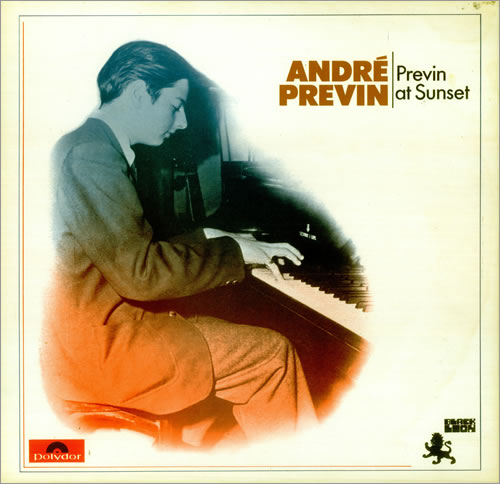
As a producer, Arthur Freed worked to strike a balance between old-fashioned show-business values, which he revered, and formal innovations which would keep those values alive and accessible to contemporary audiences. When he swung too far towards innovation he produced what might be called “interesting failures” — like Yolanda and the Thief, for example.
One of his most interesting, and most reviled, failures was The Subterraneans, from 1960 — the first Hollywood film ever made from a Jack Kerouac novel.
Kerouac wrote the novel in three days in the early Fifties and couldn't get it published for several years. It eventually emerged above-ground as a 35-cent Avon paperback original. It got a drubbing from critics but apparently sold well enough. We think of Kerouac as an avant-garde artist today, forgetting that On the Road was a national best-seller. In the Fifties he wasn't necessarily thought of as an “uncommercial” artist.
Still, it's easy to see why The Subterraneans scared off publishers and annoyed critics — it reads like a novel written in three days, which has its advantages and disadvantages. On the one hand it has the hurtling energy of a great jazz improvisation. On the other hand it's messy, uneven and often self-indulgent. Even Charlie Parker never tried to improvise a solo for three days running.

You might well ask what Freed, a producer of MGM musicals, the creator of Meet Me In St. Louis, saw in this material, but the answers are actually fairly obvious. For one thing, he saw La Bohème. The story and setting of Kerouac's novel, consciously or unconsciously, mirror the story and setting of Puccini's opera, a show-biz perennial. Kerouac wrote an obliquely romantic tale of doomed loved among modern Bohemians — the “subterraneans” of Frisco in the Fifties, a particular clique of beats.
For another thing, Kerouac's book, like the subterraneans he wrote about, was obsessed with be-bop jazz, which suggested musical possibilities for the film. It was never planned as a musical, per se, but it featured on-screen performances by some high-powered West-Coast jazz musicians and a jazz-inflected score by André Previn.

A genuine wunderkind, Previn was part of the Freed unit at MGM. He could do conventional arranging and composing for musicals in the MGM house style, but was also attracted to contemporary jazz. As a pianist he performed progressive jazz himself, quite respectably, in club settings very like the ones depicted in The Subterraneans. (Previn actually appears in the film leading a jazz trio.)
A contemporary La Bohème with contemporary music was clearly what Freed was after, and it wasn't a bad or uncommercial idea at all, as Rent was to prove several decades later — even if Freed failed to pull it off in the case of The Subterraneans.
In an upcoming post I'll discuss what went wrong, so dreadfully, dreadfully wrong, with the film, and why it didn't become the Rent of its day. In that post you'll meet, perhaps for the first time, Robert Thom, who wrote the very bad script for The Subterraneans but later went on to a kind of immortality as the author of several cult-movie classics, including Roger Corman's Crazy Mama and Death Race 2000.

To call Kerouac's Subterraneans a failure is a statement in misunderstanding….as in the 50's …some people get IT…some people don't. Hollywood killed the essence of that book and what was portrayed on screen was so completely off the Kerouac scale it was criminal. It remains one of his best narratives…brutal in honesty, tragically emotional at times….and pure Kerouac beat.
I didn't call the book a failure — I said it was uneven. I think it's a great book, though flawed.
In my upcoming post I'll be discussing why the film failed to live up to the book — to put it mildly.